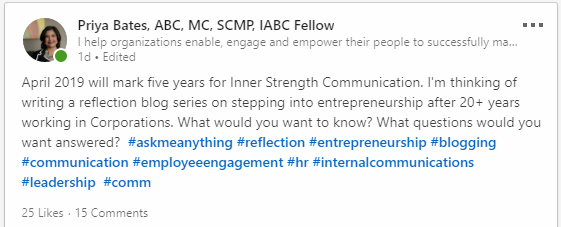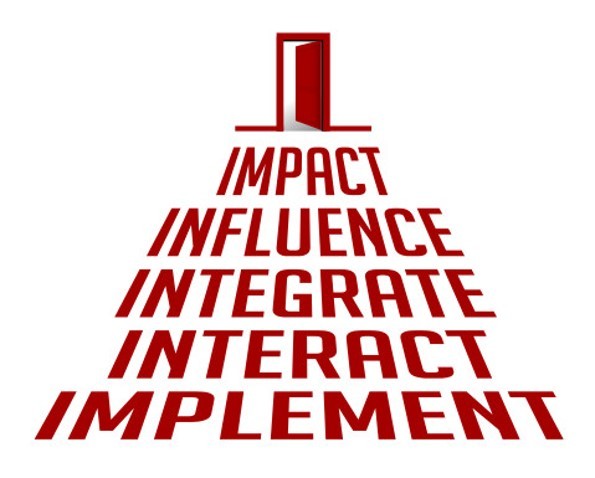
At the beginning of 2019, to celebrate the 5th Anniversary of Inner Strength Communication Inc., I challenged you to #AskMeAnything. Although work got really busy, I figure it's important to finish this series by answering a final question from Eleanor Tan(Singapore).

Eleanor's question: Where do you see internal communications in the next few years and why?
My Answer:
The future is bright for strategic internal communication practitioners who can tie their work to organizational success. In the past five years, I've seen a marked change in the conversations with clients and colleagues about internal communication. What started as a few localized projects has turned into long-term programs we can offer that get to the heart of enablement, engagement and empowerment of employees. My vision. from the beginning, was to truly establish internal communication as a key enabler of organizational success. As an agency focused in internal communication. we're no longer talking about the tactics and tools; instead, we're talking about the business problems that communication can help solve.
Problems that include:
- Lack of awareness and understanding of programs and strategies to drive delivery, service, innovation, safety and retention.
- Increased resistance during change and disruption that eventually impacts results.
- Challenges with alignment when it comes to visions, missions, values and behaviours that create a lack of trust.
- Silos that get in the way of collaboration among individuals and teams.
- Disconnected workforces that struggle with turning brand promises into consistent customer experiences.
- Launch, adoption and maintenance of technology solutions when success is dependent on practices versus platforms.
 Right now, internal communication practitioners continue to talk about change and the need for more respect; but we need to actively step into delivering internal communication expertise differently.
Right now, internal communication practitioners continue to talk about change and the need for more respect; but we need to actively step into delivering internal communication expertise differently.
That means focusing on more than implementation. We need to interact and understand our audience; integrate to connect communication to strategy; influence how our organizations, leaders and employees communicate and behave; and eventually impact business results. I've said often that our challenges are no longer about capability and capacity as much as about courage and confidence. We need to take risks. We need to understand our businesses, and we need to be accountable for results....not just outputs (the stuff we create and clicks we garner) but outcomes (their real impact on our organizations).
In North America and around the world, we're seeing anecdotal evidence of a shift:
- The growth of technology platforms now focused on the internal audience.
- The growth of conferences and workshops focused on employee communication and engagement.
- The number of practitioners leaving the organizational world to become entrepreneurs and agencies growing their internal communication practices.
- The increased focus and investment on internal communication inside organizations.
Personally, my Strategic Internal Communication Conference has doubled in size since last year and my business has seen 25%+ year-over-year revenue growth with less time from me focused on business development. In other words, potential clients are calling me and finding me through internet searches.
In the next five years, demographic shifts (five generations in the workplace); a lack of retention and loyalty; war for talent; and increasingly mobile and virtual workplaces will increase the need for internal communication done right. As leaders start to see real examples of what great looks like, and its direct impact on business results, tactical internal communication practitioners will need to step up their game or step aside as strategic professionals move forward.
Thanks for all of your questions. You can read all questions and answers in the following blog posts:
Why do you think Comms pros who run their own businesses don't call themselves entrepreneurs?
Did you wish you had become an entrepreneur earlier? Why Inner Strength?
Do you have any experiences or insight as a female leader who consulted on a project in a male-dominated industry?
What inspired you to keep going when the going got tough? How close and when were you closest to throwing in the towel? Can you give up too soon?